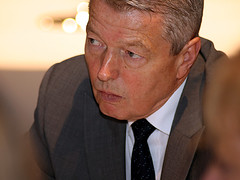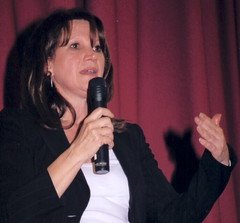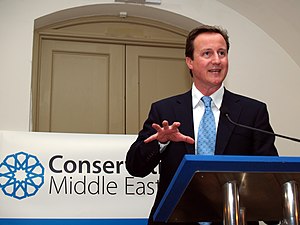 Image by Getty Images via Daylife
Image by Getty Images via DaylifeThe Refugee Council wants to see a fair, humane and effective asylum system that provides protection and enables refugees to rebuild their lives in safety. As we approach the sixtieth anniversary of the 1951 Refugee Convention next year, we are asking the new government to seize the opportunity to create such a system.
We’ll build on the success of the asylum election pledge signed by 1,031 parliamentary candidates, 219 of whom were successfully elected to parliament, including nine members of the cabinet. Pledge signatories include the Prime Minister David Cameron and Deputy Prime Minister Nick Clegg, as well as Immigration Minister Damian Green.
We’re highlighting to key ministers and all MPs the urgent need for positive, swift action across government, and calling for:
- Politicians to show leadership in defending and promoting Britain as a place of refuge for the persecuted, and using fair and accurate language about asylum and refugees.
- The UK Border Agency to get decisions on asylum claims right the first time round. High numbers of initial decisions by the UKBA are overturned on appeal. Poor decision-making is unfair on applicants, slows down the system and leads to money being wasted.
- Early access to good quality legal advice for asylum seekers. Professional, timely legal advice is essential to ensuring that asylum seekers have access to justice. This would improve the overall quality of the process, build trust in the system, and support those without protection needs who can safely return to do so.
- All asylum claims to be processed in the community. Ending the injustice of the detained fast tracking of asylum claims and processing asylum claims in the community will avoid unnecessary and inhumane treatment, lead to fairer decisions and save money.
- Immediately implement the commitment to end child detention. We are delighted that the Coalition negotiations agreement reached on 11 May 2010 includes this commitment, which should be fulfilled without delay, and in a way that keeps families together.
- Immigration detention for adults who have claimed asylum to be minimised. Detention at the end of the asylum process is massively over-used and is without essential safeguards. It must be used only as a last resort where independently shown to be necessary.
- Access to mainstream benefits and permission to work for asylum seekers. The separate ineffective and expensive system of asylum support should be replaced with access to mainstream benefits, and restoring permission to work for asylum seekers.
- An end to destitution among refused asylum seekers. Destitution is destroying lives. There is no evidence that destitution leads people to return to their home countries. Those who cannot return should be granted temporary, formal status with permission to work. Where asylum seekers do receive support, it should be in the form of cash and not a restricted payment card or vouchers. People who have sought asylum should be entitled to free healthcare and a decent standard of accommodation until they get status or return home.
- Permanent status for refugees. Refugees want to integrate, offer their skills and contribute to the UK but since 2005, most people recognised as refugees are given permission to stay in the UK for five years only. This policy is a waste of money and creates a further administrative backlog for UKBA who from August 2010 will have to review upward of 7000 cases a year. This situation should be resolved by returning to the granting of permanent status for refugees.
If you want to keep up to date with current campaigns, you can register to receive campaign support updates.
You can follow our work in parliament and keep track of parliamentary questions, debates and All Party Parliamentary Group meetings by receiving the free Parliamentary Asylum and Refugee Network newsletter, the PARN. To subscribe, email parliamentary@refugeecouncil.org.uk with the word PARN in the subject line.
Lobby for UK detention reform



![Reblog this post [with Zemanta]](http://img.zemanta.com/reblog_e.png?x-id=8aa5acc2-7f74-4a49-b65d-3f1666013941)


![Reblog this post [with Zemanta]](http://img.zemanta.com/reblog_e.png?x-id=469b3289-4273-4940-ace7-089237689f81)


![Reblog this post [with Zemanta]](http://img.zemanta.com/reblog_e.png?x-id=5428fab1-6826-4470-9310-e78234f1b41c)

![Reblog this post [with Zemanta]](http://img.zemanta.com/reblog_e.png?x-id=ec76ea1d-9d3e-4711-918d-5799a9829331)

![Reblog this post [with Zemanta]](http://img.zemanta.com/reblog_e.png?x-id=d3497988-b867-40ee-b88b-01cf4d486418)



![Reblog this post [with Zemanta]](http://img.zemanta.com/reblog_e.png?x-id=a90733df-a379-4cd6-b404-81b0440cef61)


![Reblog this post [with Zemanta]](http://img.zemanta.com/reblog_e.png?x-id=cc6ea57c-f9f2-44be-a883-b0b3d89a682a)

![Reblog this post [with Zemanta]](http://img.zemanta.com/reblog_e.png?x-id=e6dfc4e0-db47-4db1-885a-5944da2ebc13)



![Reblog this post [with Zemanta]](http://img.zemanta.com/reblog_e.png?x-id=d62046fa-9590-4a00-a109-64906038230e)

![Reblog this post [with Zemanta]](http://img.zemanta.com/reblog_e.png?x-id=594839a2-9b56-4b8d-8396-61009b403024)

![Reblog this post [with Zemanta]](http://img.zemanta.com/reblog_e.png?x-id=4f0226ff-d77a-46ec-9a8f-8ea1cd0c2b06)

![Reblog this post [with Zemanta]](http://img.zemanta.com/reblog_e.png?x-id=775b2d71-d985-4b5b-937c-8e42095231c8)





 Join our page
Join our page

